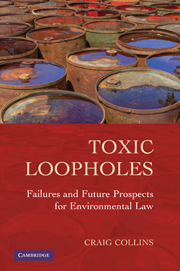Book contents
- Frontmatter
- Contents
- Dedication
- Introduction: Crime Without Punishment
- 1 The EPA – Policing or Protecting Polluters?
- 2 The Clean Air Act – Gasping for Breath
- 3 The Clean Water Act – Up Sh*t Creek
- 4 Superfund and RCRA – Toxic Trash
- 5 TSCA – The Toothless Tiger
- 6 The Endangered Species Act – Noah's Ark or Titanic?
- 7 Planetary Problems – Cooperation or Collapse?
- Conclusion: A Glimmer of Hope
- Bibliography
- Index
Introduction: Crime Without Punishment
Published online by Cambridge University Press: 05 June 2012
- Frontmatter
- Contents
- Dedication
- Introduction: Crime Without Punishment
- 1 The EPA – Policing or Protecting Polluters?
- 2 The Clean Air Act – Gasping for Breath
- 3 The Clean Water Act – Up Sh*t Creek
- 4 Superfund and RCRA – Toxic Trash
- 5 TSCA – The Toothless Tiger
- 6 The Endangered Species Act – Noah's Ark or Titanic?
- 7 Planetary Problems – Cooperation or Collapse?
- Conclusion: A Glimmer of Hope
- Bibliography
- Index
Summary
Common criminals – such as burglars, drug dealers, kidnappers and bank robbers – frequently find themselves behind bars for their crimes. But one group of lawbreakers – corporate polluters – rarely see the inside of a prison cell, although their crimes pose a greater threat to American lives, health and property than all the rest. Why? Because unlike ordinary criminals, mega-polluters have the wealth and political clout to elect the following:
Presidents who appoint polluter-friendly administrators to head up the country's pollution control agencies;
District attorneys who rarely prosecute them for their crimes;
Sympathetic judges who give them little more than “a slap on the wrist”; and
Lawmakers who will craft loopholes to make most of their offenses legal.
These powerful polluters routinely disgorge deadly toxins into our air, water and land. Every year their poisons kill more Americans than all murderers combined. Yet these corporate criminals are seldom prosecuted, rarely fined and almost never jailed.
For example:
Air pollution claims at least 70,000 American lives annually – as many as breast and prostate cancer combined – 30,000 more than all traffic fatalities and 54,000 more than all homicides.
Based on EPA data, every year between 5,500 and 9,000 Americans have their lives shortened by air pollution from power plants that the Department of Justice has taken to court for violating the Clean Air Act. These plants trigger between 107,000 and 170,000 asthma attacks annually.
Yet, according to the EPA's own records, dozens of the country's biggest corporate air polluters – including Ford, General Motors, Shell and Exxon – habitually violate the Clean Air Act by spewing tons of toxins into the air without paying a single penny in fines.
- Type
- Chapter
- Information
- Toxic LoopholesFailures and Future Prospects for Environmental Law, pp. 1 - 4Publisher: Cambridge University PressPrint publication year: 2010



